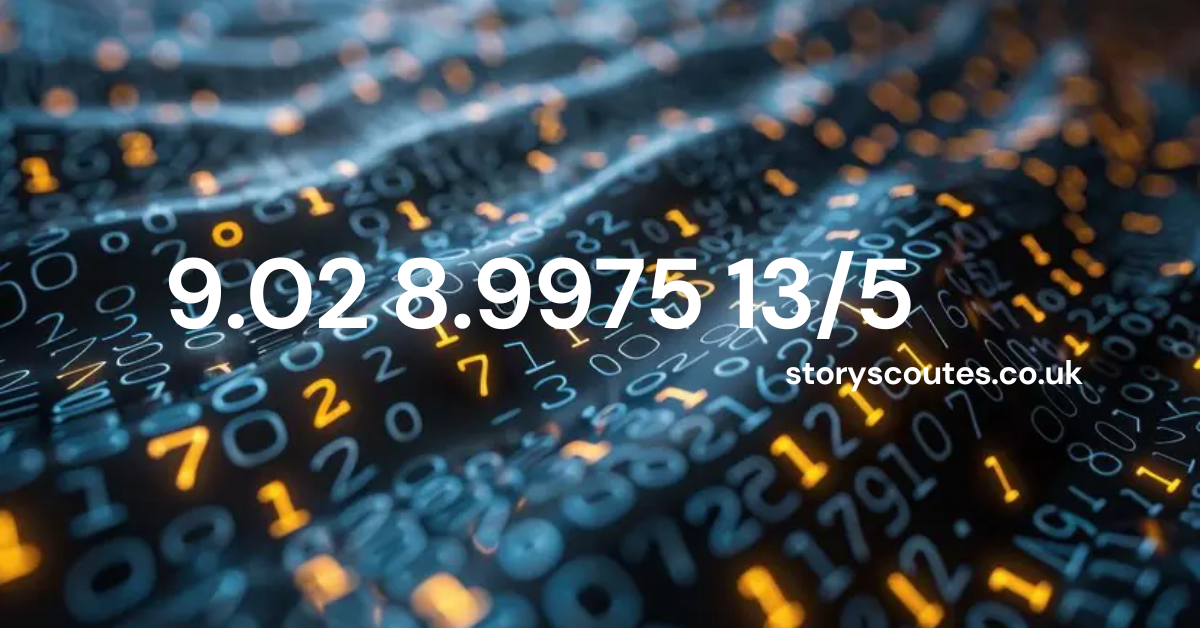9.02 8.9975 13/5 – A Deep Dive into Numbers and Their Significance
Have you ever come across a string of numbers that made you scratch your head? Well, you’re not alone! Today, we’re going to unravel the mystery behind “9.02 8.9975 13/5”. This unique combination of numbers might seem random at first glance, but there’s more to it than meets the eye. Let’s embark on a journey to understand what these numbers mean and why they matter.
What Do These Numbers Mean?
Let’s break down “9.02 8.9975 13/5” into its parts:
1. 9.02: A decimal number
2. 8.9975: Another decimal number, but with more decimal places
3. 13/5: A fraction
Each of these numbers has its own story to tell. Let’s explore them one by one.
The Magic of 9.02
9.02 is a decimal number. It’s just a bit more than 9, but not quite 9.1. In everyday life, we might see 9.02 in different places:
– On a price tag: $9.02
– As a measurement: 9.02 inches or 9.02 meters
– In science: 9.02 grams or 9.02 seconds
This number shows us that sometimes, we need more than whole numbers to describe things accurately.
8.9975: Precision Matters
Moving on to 8.9975, we see even more decimal places. This number is very close to 9, but not quite there. It’s like when you’re trying to measure something very precisely. Maybe you’re:
– Weighing gold: 8.9975 ounces
– Timing a race: 8.9975 seconds
– Measuring in a science lab: 8.9975 milliliters
When we use numbers like 8.9975, we’re saying that every tiny bit counts. It’s all about being super exact!
13/5: Fractions in Action
The last part of our number puzzle is 13/5. This is a fraction. It means 13 divided by 5. If we do the math, we get 2.6. Here’s how we might use 13/5 in real life:
– Sharing 13 cookies among 5 friends
– Measuring 13/5 cups of flour in a recipe
– Calculating 13/5 hours of work time
Fractions help us deal with parts of things when whole numbers aren’t enough.
Why “9.02 8.9975 13/5” Matters
Now that we’ve looked at each part, you might wonder why these numbers are together. While “9.02 8.9975 13/5” isn’t a common phrase or formula, it shows us different ways to express numbers:
1. Simple decimals (9.02)
2. Precise decimals (8.9975)
3. Fractions (13/5)
Understanding these different number types helps us in many areas of life, from cooking to building things to understanding science.
Numbers in Everyday Life
Let’s see how “9.02 8.9975 13/5” might pop up in your daily routine:
1. Morning Routine:
– Your alarm goes off at 6:02 (like our 9.02)
– You spend 8.9975 minutes in the shower (super precise!)
– You eat 2.6 (13/5) pieces of toast for breakfast
2. At School or Work:
– Your math test score is 90.2%
– The science experiment needs exactly 8.9975 grams of a chemical
– You finish 13/5 of your tasks before lunch
3. Shopping and Money:
– A shirt costs $9.02
– You have $8.9975 left in your piggy bank
– The store offers a “buy 5, get 13” deal (another way to look at 13/5)
Numbers in Science and Math
In the world of science and math, numbers like “9.02 8.9975 13/5” are super important. Here’s why:
1. Precision in Measurements:
Scientists need very exact numbers. That’s why 8.9975 is so useful. It tells us the tiniest details.
2. Calculations:
When doing math, we often use decimals (like 9.02) and fractions (like 13/5) to get the right answers.
3. Data Analysis:
In big data studies, every decimal place can make a difference. Numbers like 9.02 and 8.9975 help make sense of tons of information.
4. Formulas and Equations:
Complex math often uses a mix of whole numbers, decimals, and fractions. Our “9.02 8.9975 13/5” shows all these in one place!
The Art of Rounding
Sometimes, we don’t need all those decimal places. That’s where rounding comes in:
– 9.02 rounded to the nearest whole number is 9
– 8.9975 rounded to two decimal places is 9.00
– 13/5 (which is 2.6) rounded to one decimal place is 2.6
Rounding helps us make numbers easier to work with while still being close enough for many purposes.
Numbers in Technology
In our tech-filled world, numbers like “9.02 8.9975 13/5” play big roles:
1. Computer Programming:
Coders use all sorts of numbers to make software work right.
2. Digital Displays:
Ever see 9:02 on a digital clock? That’s our 9.02 in action!
3. Precision Engineering:
Building things like smartphones needs super exact measurements, maybe as precise as 8.9975 millimeters.
4. Data Storage:
Computers store numbers in binary, but they can show us decimals and fractions when we need them.
The Psychology of Numbers
Believe it or not, numbers like “9.02 8.9975 13/5” can affect how we think and feel:
1. Pricing Strategy:
Stores might price something at $9.02 instead of $9.00 to make it seem more precise and fair.
2. Test Scores:
Getting 89.975% on a test feels way different from 90%, even though they’re super close!
3. Time Perception:
Waiting 13/5 hours for something might feel longer than just saying 2.6 hours.
Numbers in Nature
Even Mother Nature loves numbers! Here’s how our “9.02 8.9975 13/5” might show up in the natural world:
1. Animal Behavior:
Some animals might sleep for 9.02 hours a day.
2. Plant Growth:
A rare flower might grow exactly 8.9975 inches tall.
3. Ecosystems:
The ratio of predators to prey in a forest might be close to 13/5.
The Future of Numbers
As we move forward, numbers like “9.02 8.9975 13/5” will keep being important:
1. Artificial Intelligence:
AI needs super precise numbers to make good decisions.
2. Space Exploration:
Getting a rocket to Mars needs calculations way more complex than our example!
3. Medical Advances:
Developing new medicines often requires exact measurements down to many decimal places.
Conclusion
So there you have it! “9.02 8.9975 13/5” might look like a random string of numbers, but it represents the amazing world of math all around us. From simple decimals to precise measurements to handy fractions, these numbers show up in our daily lives, in science, in nature, and in our future. Next time you see a number, think about all the cool ways it might be used!
FAQs About “9.02 8.9975 13/5”
Is “9.02 8.9975 13/5” a special math formula?
A: No, it’s not a special formula. It’s just an example of different types of numbers: decimals and fractions.
How do I pronounce “9.02 8.9975 13/5”?
You’d say it as “Nine point zero two, eight point nine nine seven five, thirteen fifths.”
Can I use “9.02 8.9975 13/5” in my math homework?
While it’s not a standard math problem, you can use these numbers to practice decimal and fraction calculations!
Why is 8.9975 written with so many decimal places?
It shows how we can be very precise with numbers when needed, like in scientific measurements.
How do I convert 13/5 to a decimal?
Divide 13 by 5. The answer is 2.6.
Are there real-life situations where I’d use all these numbers together?
It’s rare to use them all together, but you might use similar numbers in cooking, science experiments, or financial calculations.
How does “9.02 8.9975 13/5” relate to everyday math?
It shows different ways we use numbers daily: simple decimals (like prices), precise measurements, and fractions (like in recipes).
Can computers handle numbers like “9.02 8.9975 13/5”?
Yes! Computers are great at working with all kinds of numbers, including complex decimals and fractions.
Is there a pattern in “9.02 8.9975 13/5”?
While there’s no specific pattern, all these numbers are close to 9 or can be converted to numbers close to 9.
How important is it to understand numbers like these?
Understanding different number types is very important in many fields, from basic math to advanced science and engineering.






